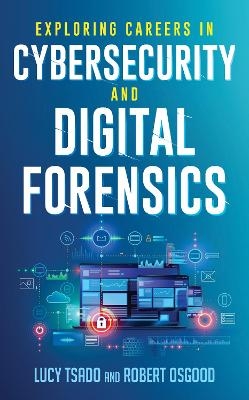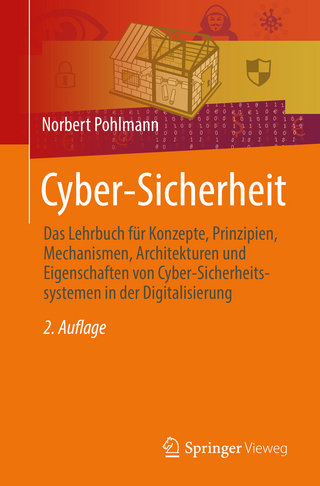
Exploring Careers in Cybersecurity and Digital Forensics
Rowman & Littlefield (Verlag)
978-1-5381-4061-1 (ISBN)
Cybersecurity is a fairly new academic discipline. Therefore, most of the books written are mainly focused on classroom material and resources. To the best of our knowledge, there isn’t a book that targets criminal justice and other nontechnical students from a career choice standpoint, while also providing needed guidance for a career in the field. Exploring Careers in Cybersecurity and Digital Forensics will guide students in understanding the unique opportunity that a career in digital forensics and cybersecurity provides, and a plan for how to navigate the vast amount of resources like formal education, digital forensics/cybersecurity certifications and other career building tools available.
While the cybersecurity field and profession are fully aware of the skills gap and the opportunities that are available, other nontraditional students are not. Human behavioral disciplines like criminal justice, psychology, law and some other disciplines like business, engineering and political science are not aware that their skills are also relevant and lacking in the digital forensics/cybersecurity field. This book will draw awareness and attract the attention of those nontechnical students and professionals that would not typically be involved in cybersecurity education. Moreover, with the continued rise in cyberattacks, the need for technological and non-technological skills in responding to digital behavior that is criminal, as well as the requirement to respond, investigate, gather and preserve evidence is growing. Careers in Cybersecurity, Cyber Defense and Digital Forensics will therefore be a useful tool for both students and those who are in the position in helping them make career decisions. Counselors and school administrators in both high school and undergraduate programs will benefit from the information in this book.
Lucy K. Tsado, PhD, is an assistant professor in the Department of Sociology, Social Work and Criminal Justice at Lamar University, where she teaches cybersecurity, digital forensics, cybercrime, corrections, criminal justice policy, planning and evaluation, class, race, gender and crime to criminal justice students. Robert Osgood is an engineer, CPA, and a 26-year veteran FBI Computer Forensics Examiner and Technically Trained Special Agent. His specialties include: digital forensics, data intercept, cyber-crime, enterprise criminal organizations, espionage, and counter-terrorism. In the course of his work, he has performed digital forensics research and development and created unique new software tools for digital forensic law enforcement. He also serves as a digital forensics consultant to Probity Inc. working with the Truxton development team. He formed the first FBI computer forensics squad in 2000, served as the Chief of the FBI’s Digital Media Exploitation Unit and was part of the team that executed the first court-authorized digital computer intercept at the FBI. Osgood managed and deployed the Washington, D.C. gunshot detection system.
Chapter One: What Is Cybersecurity?
Cybersecurity and The Criminal Justice Connection
The Evolution of Digital Forensics
Chapter Two: The Cybersecurity Skills Gap: An Opportunity for Criminal Justice Students
Criminal Justice Students and The Infusion of Cyber Forensic Skills
What Educators, Advisors, And Career Counselors Need to Know
How Can A Student Attain A Successful Cybersecurity Career?
Chapter Three: It’s All About Skills
Digital Forensics Swim Lanes
Digital Media Forensics
Network Forensics
Cloud Forensics
Memory Forensics
Mobile Device Forensics
Reverse Engineering
What Baseline Skills Do I Need to Bring?
Programming
Operating Systems
Networking
Soft Skills
Written Communications Skills
Interviewing Skills
Legal Skills
Chain of Custody
Other Legal Stuff
Non-Examiner Based Analytical Skills
Chapter Four: Chapter 4: Education and Certifications
Cyber Security Programs
Certificate Programs (Certs)
Formal (Academic) Education
Undergraduate Programs
Graduate Programs
Components of An Effective Digital Forensics Program
Online Programs
Cost
How to Pick an Institution?
The Centers for Academic Excellence (CAE) Designated Institutions
Chapter Five: Chapter 5: Cybersecurity Career Opportunities in The Field of Criminal Justice
Current Opportunities and Jobs Needing Cybersecurity in Criminal Justice
Jobs Within the Federal Government (Public Sector)
Jobs Within State and Local Governments (Public Sector).
Courts and Corrections
Jobs Within the Private Sector
National Initiative for Cybersecurity Education (NICE) Cyberseek
National Institute of Standards and Technology (NIST) Workforce Framework
Other Important Roles
Chapter Six: Planning Your Path into The Cybersecurity Field
A Proposed Model for A Successful Cybersecurity Education and Career.
Education
Training and Certifications
Other Activities That Are Important for Students’ Success
Networking
Conferences
School Career Advancement Activities
Internships
Apprenticeship
Clubs and Social Organizations
Competitions
The Role of Colleges and Their Community
Chapter Seven: Getting the Job and Entering the Digital Forensics Field
Setting Up A Home Digital Forensics Lab
Looking for The Job Posting.
Persistent but Not Annoyance
The Resume
Conclusion: Career Advancement in Cybersecurity
Recap of Previous Chapters
Questions Students Should Ask Themselves Before They Begin A Career/As They Progress Through Their Career.
Tips for Advancement in The Cybersecurity and Digital Forensics Field.
After A Cybersecurity Career, What Next?
Retirement: Was It All Worth It?
Appendix 1: Complete List of Feeder Roles According to Cyberseek.Org
Appendix 2: Cybersecurity Roles Suitable for Criminal Justice Students Adapted from Cyberseek.Org
Appendix 3: Cybersecurity Roles for Criminal Justice Students. Adapted from The NIST SP 800 181
| Erscheinungsdatum | 17.08.2020 |
|---|---|
| Verlagsort | Lanham, MD |
| Sprache | englisch |
| Maße | 149 x 215 mm |
| Gewicht | 367 g |
| Themenwelt | Sachbuch/Ratgeber ► Beruf / Finanzen / Recht / Wirtschaft ► Bewerbung / Karriere |
| Informatik ► Netzwerke ► Sicherheit / Firewall | |
| ISBN-10 | 1-5381-4061-6 / 1538140616 |
| ISBN-13 | 978-1-5381-4061-1 / 9781538140611 |
| Zustand | Neuware |
| Haben Sie eine Frage zum Produkt? |
aus dem Bereich


